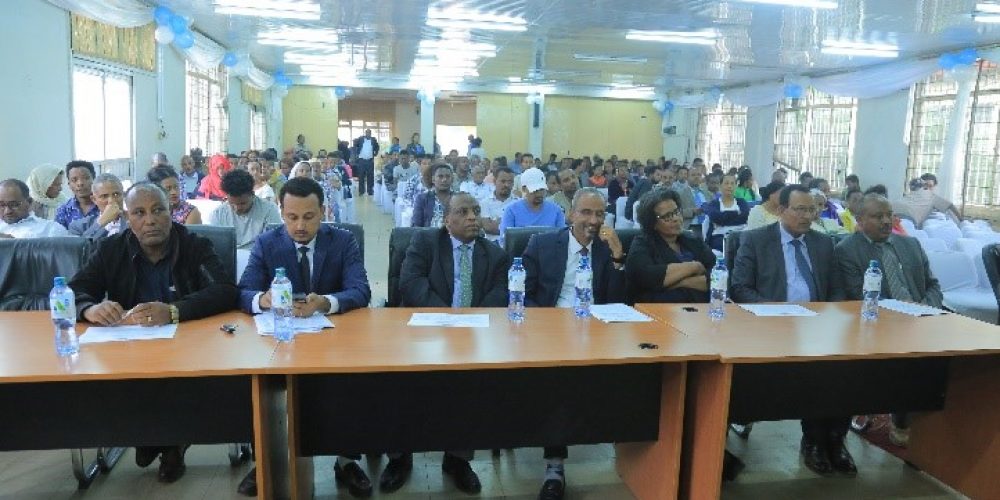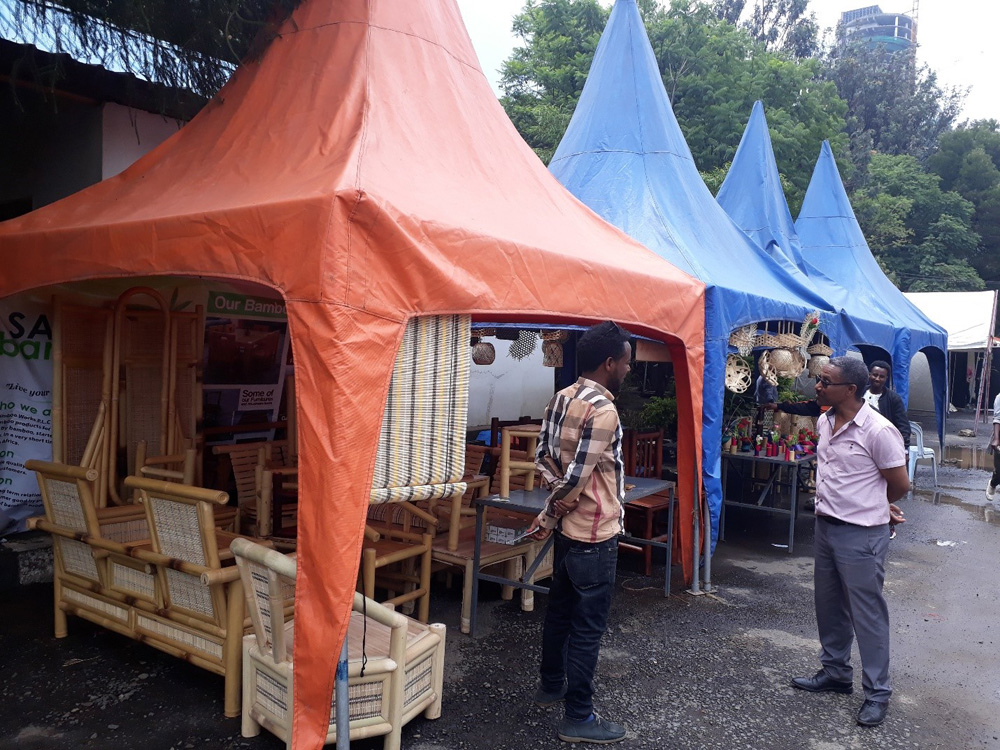
INBAR’s Dutch-Sino-East Africa Bamboo Development Programme continues to further INBAR’s goals and support bamboo producers, manufacturers and consumers in the region with two bamboo-based activities in Ethiopia: a training workshop on sustainable management for bamboo farmers, and an exhibition of bamboo products. 26 July, 2019 – The ongoing Dutch-Sino East Africa Bamboo Development Programme is based in Uganda, Kenya, and Ethiopia and aims to help these nations capitalise on their as yet largely untapped bamboo sectors. In June 2019, the project organised two activities in Ethiopia aimed at promoting sustainable management of bamboo resources and at raising the profile of bamboo.

Ethiopia has been an INBAR Member State since 2002, and hosts INBAR’s East AfricaRegional Office. Successful bamboo initiatives have taken place in Ethiopia, including using bamboo to restore degraded land and mapping the country’s available bamboo resources. This project builds on the work of these past initiatives and aims to reduce poverty, promote sustainable development; increase international trade and investment; and mitigate climate change.

The project has already been working towards these goals by supporting the development of viable industrial value-chains in Ethiopia’s bamboo sector. Most recently this support took on the form of a two-week long on-farm training on sustainable management and harvesting. The training, which took place from 22 May to 4 June 2019 at the Arbegona Woreda, Sidama Zone, Southern Nations, Nationalities, and Peoples’ Region, Ethiopia, included classroom sessions, practical demonstrations, and the implementation of learnt skills on bamboo farms.

Forests and plantations which are not optimally managed can lead to drops in productivity and in the quality of the bamboo poles. In order to develop enterprises and industries, it is essential to sustainably manage and harvest bamboo to ensure a good quality supply of raw materials for processing. This increased productivity benefits all stakeholders in the value chain including bamboo farmers who manage these resources.

The workshop aimed to promote sustainable management strategies and was attended by over 100 farmers who during the latter half of the workshop were able to put their new skills to the test. Together they brought approximately 50 hectares of on-farm bamboo plantation under a sustainable management and harvesting regime. This was accomplished in part by recording detailed data about the bamboo farm using the INBAR bamboo assessment mobile app. By the end of the training, new shoots were planted in the managed bamboo farm and new ideas were planted in the minds of the farmers.
The training and practical exercises have also motivated the farm owners to pursue similar activities in the future. In addition to the environmental benefit, it is expected that the farmers will be able to improve incomes. Initially this increase would stem from selling age-graded, quality bamboo culms to local markets and bamboo processing companies, but in the future, it could include carbon payments from sustainably managed bamboo stands.
Apart from this workshop, the programme has also been busy promoting bamboo at the other end of the chain. An 8-day exhibition (3-9 June 2019) for bamboo producers in Ethiopia was organised by INBAR in collaboration with Federal Small and Medium Manufacturing Industries Development Authority in Addis Ababa.
The exhibition was a great way to raise the profile of bamboo and an opportunity for many important stakeholders of the bamboo sector in Ethiopia to exhibit their products. The exhibition was opened by H.E. Ato Teke Gebreyes (pictured above), the Ethiopian State Minister of Industry, who expressed his appreciation of the efforts made to organise the exhibition and bring the bamboo sector to the forefront. He also promised to provide the necessary to support to mainstream the bamboo industry in Ethiopia. The exhibition was visited by thousands of people who got to see for themselves some of the incredible products that can be made from bamboo.
One of the exhibitors, Ms. Kidest Alemayeu, stated that the exhibition provided an opportunity to sell bamboo craft products and to connect with buyers and colleagues from the bamboo sector. Dr. Gulelat Gatew, from the engineering company African Bamboo, mentioned that this is the first exhibition and bazaar where they have been able to showcase and promote their products.
The exhibition provided an opportunity for these exhibitors, and many others, to interact and network with other people working in the bamboo sector. With 1.47 million hectares of bamboo, Ethiopia has the capacity to develop a thriving bamboo industry. Across the sector, from the harvesting of raw bamboo to the selling of finished products, efforts are being made to harness this enormous potential. Through this project and others, INBAR looks forward to continuing its collaboration with Ethiopia to create a sustainable and equitable future. For more information about the INBAR led project ‘Dutch-Sino-East African Bamboo Development Programme’, please read here.